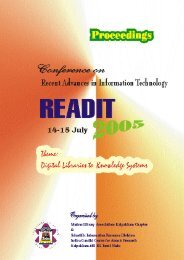READIT-2007 - Indira Gandhi Centre for Atomic Research
READIT-2007 - Indira Gandhi Centre for Atomic Research
READIT-2007 - Indira Gandhi Centre for Atomic Research
Create successful ePaper yourself
Turn your PDF publications into a flip-book with our unique Google optimized e-Paper software.
Global<br />
highly competitive<br />
fast changing<br />
based to a great extent on knowledge as the key asset<br />
“In an economy where the only certainty is uncertainty, the one source of<br />
lasting competitive advantage is knowledge. When markets shift, technologies<br />
proliferate, and products become obsolete almost overnight, successful companies are<br />
those that consistently create new knowledge, disseminate it widely throughout the<br />
organization and quickly embody it in new technologies and products.” (2)<br />
2. WHAT IS A COMMODITY?<br />
The "New Ox<strong>for</strong>d Dictionary of English" defines commodity as:<br />
"a raw material or primary agricultural product that can be bought or sold,<br />
such as copper or coffee a useful or valuable thing such as water or time".<br />
The "Concise Ox<strong>for</strong>d Dictionary" has:<br />
"an article or raw material that can be bought or sold, especially a product as<br />
opposed to a service. a useful thing".<br />
The "Chambers Dictionary" offers:<br />
"an article of trade; (in plural) goods, produce; profit, expediency, advantage,<br />
convenience or privilege (archaic)"<br />
I doubt that any of us here would argue against the idea that in<strong>for</strong>mation is a<br />
"useful thing". For the purposes of this paper, I intend to define a commodity as "an<br />
item that can be bought or sold". Under this definition, then the answer to the question<br />
posed in the title must be ‘yes - in<strong>for</strong>mation is a commodity’.<br />
3. CONCEPTUAL DEFINITION<br />
3.1. In<strong>for</strong>mation<br />
With the in<strong>for</strong>mation revolution, communicators need to clearly define<br />
knowledge, re-evaluate the Library & in<strong>for</strong>mation professionals’ role in the<br />
in<strong>for</strong>mation transfer chain as both in<strong>for</strong>mation producers and consumers, and reexamine<br />
how and why we produce in<strong>for</strong>mation. In the last two decades, the rapid<br />
penetration of desktop publishing and Web technologies not only changed the design<br />
of in<strong>for</strong>mation but also introduced new power and challenges in its dissemination.<br />
The average user can design in<strong>for</strong>mation and distribute it via a Web site literally<br />
within minutes. This new power has led to an abundance of in<strong>for</strong>mation that some<br />
have called the "in<strong>for</strong>mation overload." In<strong>for</strong>mation has become a commodity<br />
because the tools and venues <strong>for</strong> creating and distributing in<strong>for</strong>mation are widely<br />
available. Consequently, I argue that the notion of in<strong>for</strong>mation as we know it is<br />
fundamentally meaningless. The "real value" of in<strong>for</strong>mation results when creators of<br />
I-8

















